- Home
- Harry Harrison
The Military Megapack Page 20
The Military Megapack Read online
Page 20
“Yes, sir,” Hymie lifted his head slightly.
“He wanted to land his plane so that it could be used again, but everything was against him. It was a very wonderful landing.
“He came down in a field and hit a tree. But not badly, just enough to throw Whiteley out upon his neck. But he talked a lot before he died.”
“Yes, sir. And his Whirly?” Hymie asked.
“It is going to be all right. When the aircraftsmen get through with it. It will fly again.”
Hymie looked up at the Wingco for a moment or two, immobile, very steady, and then said, quite distinctly, “I want that ship. I want Whiteley’s Whirly, sir.”
“You will get it, Kaplin. The order has gone through. Whiteley must have known you would want his ship. Members of a squadron get like that—flying together gives them tremendous faith in each other. Whiteley left three words for you especially, Kaplin, ‘Carry on, Yank,’ he said. You understand?”
Hymie stood up. “Yes, sir,” he said, and saluted.
“Good.” The Wing Commander permitted a slight smile to cross his tired face. “You’ll report back to the Nissen huts as S.L.”
Hymie went out of the office, bent nearly double against the driving rain that had replaced the snow. He walked along the slushy perimeter, the gray-green Sterling no longer there to obstruct his passage. Suddenly he stood erect, walking with his face against the storm, and his shoulders became a little squarer than usual, his quick step, a little quicker.
* * * *
Hymie wondered how the rest of them would take the news of his being given Whiteley’s command?
“Well,” he mumbled, “I didn’t ask for it. I may not be worth a damn, but I’m going to do the best job I can.” He stopped on the path before the squadron orderly room as a batman came staggering from his cubicle door with Whiteley’s roll carefully packed and labeled.
Luzon was right behind the batman. “Hey, Yank,” he said, “come in outa the wet.”
All at once Hymie wanted this big lug of a French-Canuck to understand how it was. He opened his mouth to explain—and the alert speaker on the pole beside the door began to squawk into the late afternoon:
“Attention, please! Flight forty-three to readiness immediately! All reserves stand by. Flight forty-three to readiness. That is all!”
“That’s we.” The rain had stopped, but Hymie noticed only the change in Luzon’s voice. “Lead the way, Boss.”
“I’m up in orders,” Hymie said. “You know?”
“Sure, Cornish told it to us. Come oonnn, Yank!” Apparently Luzon hadn’t had time to do any weightlifting at all.
Alert cars began splashing about. An ambulance, with a pretty girl at the wheel, screamed around a corner. Armorers draped with Browning belts staggered across the patch.
“Frenchy,” Hymie grabbed Luzon’s shoulder, “I’m a dirty—”
“Come oonnn,” Luzon said, “their revving up. Forget the talk!”
Luzon raced for his hut. Cornish came out of the orderly room shouting.
Hymie wheeled. “You—Yank,” Cornish called, “the train is yours.… Take the throttle.” He held up his clenched fist—the Squadron Leader’s badge of authority—“show them that. They’ll follow you. They’ll follow you to Berlin!”
Hymie’s batman met him with his gear open and ready to jump into.
“Hime bloomin’ glad, sor. We’re hall with you, sor. ’Ow you feel, sor?”
“Tell the boys that I’ll have Whiteley’s,” Hymie bent over and snapped his crotch straps, “Squadron Leader Whiteley’s Whirlwind. Be sure and tell them that.”
“Aye, sor!”
The alert speaker was still squawking when a car came up and squealed to a partial stop and Hymie hopped aboard, his Irvin pack bumping against his thighs. Swifty Morris pounded him on the shoulder and grinned encouragement.
Doorn pointed to the double row of braid on Hymie’s shoulder straps, and saluted silently. The car pulled to a stop and Hymie jumped off, and did not stop running until he reached his plane. Whiteley’s plane.
A flight sergeant saluted and screamed into his ear. “Mass formation attack at twenty-two thousand up above. Best of luck in your scramble, sir.”
The Whirlwinds strained in their shelters like nervous runners on the starting line. Hymie liked the sounds in the nose of his baby. “Those greaseballs,” he mumbled, “they did a nice job on Whiteley’s Whirly. I only hope I can do a nice job with it.” He sat down comfortably and snapped on his set.
The speaker over the petrol lorry screeched above the bedlam, like a parrot shouting at a stalking cat, “Attack alarm! Attack alarm! Flight forty-three scramble immediately! Blue Squadron and reserves stand by!”
Hymie waved to his crew and ran Whiteley’s Whirlwind out into the open. He waited until the others lined up behind him, and then stuck his gloved fist out of his greenhouse.… In two minutes he reported to the Duty Officer, “Flight forty-three airborne. Please advise of action position.”
“Axis mass formation, fifty plus at thirty thousand. Plot over Number Nine Kite,” the earphones answered. “Take ’em, Whirlwind Squadron!”
“We’ll moider ’em,” Hymie thought. “Me anna team.”
* * * *
The Whirlwinds in Vee formations climbed toward the indicating Ack-Ack explosions that were bracketed on a diamond formation of Junkers Ju 88 bombers with an escort of Focke-Wulf 190s over the Thames. Hymie lifted his eyes to his retrospect mirror and saw that Luzon was tailing his port elevator. Luzon was supposed to be in Section B. Hymie wondered about that. He must have switched with Greddie Hayward.
He kept half an eye on the bombers. He gave the fighters all his attention. He caught himself reciting Whiteley’s words, “All right, Red Flight, line up for wedge attack. No chasing Jerry across the gulley. I’ll concentrate on the One-oh-nine-Gee—if I can find one.”
Then he bit his lip. There was another command to give, and he couldn’t issue it. This was what Luzon meant by his “one-for-all, all-for-one” bromide. Hymie took off his gloves and rubbed the hairy back of his right hand across his mouth. Then he stiffened.
“Go it ahead, Yank. I’ll tail ya, pal.” That was Luzon’s voice. “I wish it I had a barbell here. Verreee good theeng to drop on the Boche’s head.”
Hymie grinned and got out from under a Junker’s bomb door in a hurry and dodged tracers lining up before his nose.
The two Whirlies banged through and pounded after the box formation of fighters. Hymie sensed that if the 109-G was anywhere, it would be behind the F-W 190s. The slob would be protected from all sides.
“Stick with me, Frenchy,” he said. “I’ve got to get that leader slob out. That’s a Messerschmitt One-oh-nine-Gee. That’s the liverwurst Whiteley was after.”
“Lead it on, MacDuff. Frenchy, she right weeth you, chum!”
A Ju rolled round and round in the sky with both wings folded back over the chicken-coop. A Focke-Wulf raged after at them, but Hymie found himself sitting nice if not pretty in his little seat. He glanced up into his mirror and grinned. Not even a deflection shot would get him now.
The lightning fast F-W squirmed and tried to get out of the front line to a second rank man. Hymie pressed the button on a two-second burst, and it wobbled away and left the Messy in the open again. Luzon was skidding hither and yon over his rudder post and screening off the converging fire of two attackers. Hymie jibed carefully and tiptoed toward the 109-G again. His four-second burst tracered under the black cross on the left starboard wing, and the Heinie staggered out of position and reeled drunkenly outside the formation.
“Geeve it her hell, chum,” screamed Luzon.
“You ain’t kiddin’! Nice tailin’, Frenchy. Stick with me, you muscle-head, you.”
Three 190s were slugging the weightlifting wingman, but he just laughed and wobbled his rudder and stormed back and forth behind his Squadron Leader. Hymie put his hand on the button, drew another careful bead on the Mess-up and
gave it five seconds. He held his sights hard on the black swastika painted on the rudder.
The 109-G wobbled and shook like a duck shot in its tail. The two Whirlies screamed over as it pulled up slowly out of a zig-zag fall. They saw the enemy turn over on his back, the two bug-eyes of the wheel wells opened in painful haste, and the unwritten law of surrender was hung up.
The Nazi had taken enough. He had decided not to risk his Nordic neck. He pulled down his wheels for a forced landing!
“Herd her down, Boss,” Luzon yelled. “Herd her right into the Wingco’s backyard!”
They held their position and shooed the wounded duck well out of the fight. Hymie looked into his mirror and saw the holes in Luzon’s wings. He realized suddenly what the guy had been taking to protect him. “Listen, musclebound,” he said. “There’s daylight showing through your buggy. You tail this Messy down. He’s yours. I’m going back upstairs and take my team back to the showers.”
“Yes, sir!” said Luzon, who knew that here was a new Squadron Leader whom he would follow anywhere. “He buggy she wobbly, but I get him down.”
“You run that One-oh-nine-Gee right into the hangar without a scratch. Understand?”
“Yes, sir.”
“Nice tailing, Frenchy. Nice teamwork, musclebound.”
“Nice leading,” replied Luzon. But Hymie did not hear. Hymie was zooming topside, clenching the responsible fist of authority as he zoomed.
THEY DIED IN VAIN, by George Bruce
CHAPTER I
Preening for Flight
Juan Jimenez was born of peasant stock. He could still remember his childhood and the pinch of hunger in his belly. He could still remember the odor of sweat that came from the body of his father at the end of day. He could still remember the sweat-blackened shirt clinging to the muscle contours of his father’s stooped back and heavy chest, and the gnarled, twisted fingers of his calloused hands, and the vacuous expression of his toil-sodden face.
Until he was ten, Juan Jimenez believed that all mothers had eyes which seemed eaten by fatigue and dulled with the hopelessness of staggering labor in the fields and in the home. He thought it quite natural that ten members of a family should lie down to sleep together on the hard mud floor of a one-roomed house, the hardness of the earth broken by a tick stuffed with chaff. He thought it quite natural that there was never quite enough to eat, and that he must work from sunup to sundown over rocky, hilly land to coax meager existence from a soil long since spent of its energy to create life.
He thought it quite natural that Don Jaime de Cordova y Badajoz should come riding over the hill on his white horse, with his saddle heavily plated with silver and his bridle and bit set with sparkling stones. He thought it natural also that Don Jaime should dispense the justice of the land—should sit out in the open field, behind his great table, with two uniformed soldiers behind him, and should merely have to speak, for the lash to fall on a naked back, or the heavy doors of the jail to close upon an offender.
Don Jaime was omnipresent and omnipotent. One could not offend Don Jaime, nor shirk his service. The lash was there, coiled, ready to hiss, and the naked blades of sabers ready to leap from the sheaths to uphold the power of the Law.
* * * *
Until he was ten, Juan Jimenez knelt in the dust of the roadside—the crooked, dusty, rocky track that led over the hills to Badajoz—when Don Jaime came riding over his fields. Knelt, as did all others of the land over which Don Jaime was patron and which he held from the King himself. The dust curled up from under the hoofs of Don Jaime’s horse, and from under the feet of the horses of his escort and settled upon the head and wet face of the little boy in the road.
When Juan was ten the miracle occurred. Don Jaime came riding over the hill into the little village of mud huts. Sitting his horse proudly. An Arabian stallion which fretted and minced and spurned the earth with his feet and seemed to strike fire with his hoofs. A thoroughbred who carried his head high and pointed his delicate, small ears, and champed at the bit with his pink mouth.
He came galloping into the mean street. A girl child, an infant, screamed for some reason, rose up out of the street, fled, almost under the hoofs of the Arabian. And the hoarse, startled, reared violently, lunged sideward. The proud figure of Don Jaime slipped perilously from the saddle, fell with one foot trapped in the heavy, metal-covered stirrup. The stallion lashed out with sharp, fast hitting heels, and galloped crazily through the streets, with Don Jaime bumping against the earth, his fine uniform dragging in the dust.
There was a yell of alarm from the escort and a clatter of hoofs, but Juan Jimenez was quicker than the rest. At the first leap of that white horse he had thrown his body forward. His hands had seized the horse’s mane. His young legs drove his body up from the ground, and he came down astride the neck of the Arabian. He clutched the heavy curb bit, dragged back with all his strength.
And magically the white horse came to a stop, stood trembling, with rolling eyes. Stood, and the escort threw itself from saddles and helped Don Jaime extricate himself from the stirrup. For a long moment Don Jaime stood there, his face white, his head bleeding a little, staring at the stallion and at the boy who sat astride of his neck, gripping the reins, holding the horse in check.
Then Don Jaime walked forward slowly and looked up at Juan. “What is your name, boy?” he asked.
“Juan Jimenez, Excellency. I am the son of Jose Jimenez who is your tenant.”
“Where did you learn to ride?”
“I did not learn, Excellency.”
Don Jaime made a face for the benefit of an officer of his escort. “He did not learn!” he repeated.
The officer laughed. He was relieved that Don Jaime should take this so well. “All these little monkeys are born riders, Excellency,” he told Don Jaime.
“He has a straight back and a strong body and a quick eye,” remarked Don Jaime. He looked up at Juan again. “How did you think to do that?” he demanded.
“I did not think, Excellency. I—just—did it—because Your Excellency was being hurt.”
“You know you saved the life of your patron?” Don Jaime asked, almost fiercely. “What kind of a reward do you think you should have for such a service?”
Juan looked at the great man. “I did not act for reward, Excellency. Such a small thing—”
Don Jaime’s face blackened for an instant. “So, you think it a small thing to save the life of a Cordova?” he asked.
“No, Excellency, that is a great thing, but my part was so small. A Cordova would have saved himself without my aid.”
Don Jaime stared. Then he laughed. “By heaven—that does not sound like the utterance of a peasant! That was spoken like a diplomat. This boy has possibilities! What do you want to be, boy?” he asked.
Juan’s eyes glittered for an instant, looked at the uniform of Don Jaime and his officer, then he lifted his head.
“I would like to be a soldier—an officer,” he said firmly.
“Can you read?” asked Don Jaime.
Juan Jimenez stared. “Read?” he faltered. “No, Excellency.”
“You must read and write and count to be an officer.”
“Yes, Excellency.” There was a sudden collapse in the young voice. The knowledge of the impossible. That all things were always impossible.
“An officer, eh?” said Don Jaime ruminatively. “He would make a good officer—to think and act so rapidly. Yes—a good officer. Send me your father, boy,” he said suddenly.
Juan Jimenez watched his father push forward through the knot of villagers about Don Jaime. “I am the father, Excellency,” he said humbly.
“You have a good son there,” praised Don Jaime. “A fine son.”
“I have five more sons—and two daughters,” explained the father nervously.
“You will send me this son—to Badajoz—at once,” commanded the Don. “He wants to be an officer. He shall be an officer—you hear what I say?”
The father
took a deep breath. His mouth opened for an instant, but it closed again. Finally he said: “Yes, Excellency.”
The patron turned to his steward. “See that Jose Jimenez is relieved of the necessity of paying taxes for three years. Give him one hundred pesetas in gold. This because his son saved the life of a Cordova.”
And Juan Jimenez saw his father’s knees sag until he was kneeling in the dust with his hard, toil-coarsened hands clasped in ecstasy, his face working, with wonder on it.
“A million thanks, Excellency. A million prayers for the health and life of Your Excellency. A million blessings upon the head and house of Your Excellency—”
Don Jaime lifted the boy down from the stallion.
“You heard?” he asked. “You will come to Badajoz tomorrow to begin being an officer.”
Juan Jimenez’ heart was thumping. “I hear, Excellency,” he said.
Don Jaime mounted the quieted white stallion. In the doorway of the hut, Juan Jimenez’ mother held her son in her arms and wept over him, and called upon God to witness the miracle of such a son.
And the next morning, with the sun, Juan Jimenez went over the hill, along the road, toward Badajoz and the house of Cordova.
CHAPTER II
Skies Stained Scarlet
Captain Juan Jimenez stood on the heights at Pamplona beside his tri-motored Caproni bomber. With the dawn, men had been loading the belly of the bomber with iron eggs. The great ship bulked hugely and dwarfed the men. A sergeant-mechanic in the cockpit started the motors one after the other. They coughed and spat or gushed blue smoke and flame before they settled into a steady, rhythmic beat.
Captain Jimenez was studying a map of the French-Spanish border around Irun. His flight commander, General Molo, placed his finger on the map.
“You understand, Jimenez?” he asked tersely. “The whole section between Irun-Behobia-Biriatou must be cleared. You must give special attention to the enemy machine-gun concentrations which are resisting troop advances. The main fighting centers about La Puntza hill on which the government troops are making a last stand. Comb the territory carefully, fly low, look for resistance, bomb it out of existence. La Puntza is the last town standing between us and Irun and we must have Irun tomorrow.”

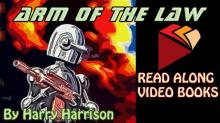 Arm of the Law
Arm of the Law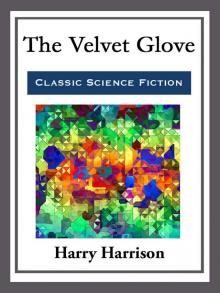 The Velvet Glove
The Velvet Glove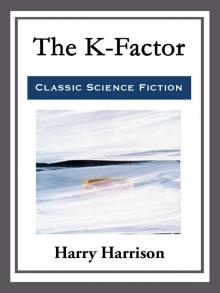 The K-Factor
The K-Factor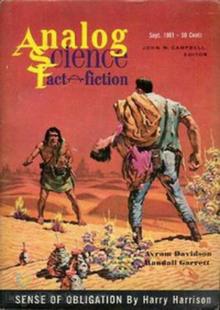 Sense of Obligation
Sense of Obligation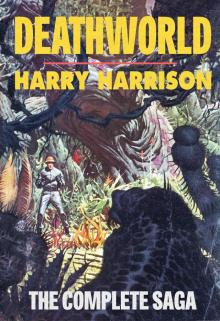 Deathworld: The Complete Saga
Deathworld: The Complete Saga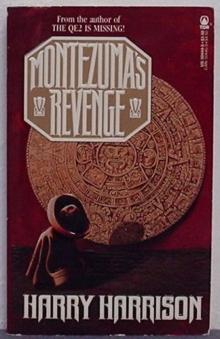 Montezuma's Revenge
Montezuma's Revenge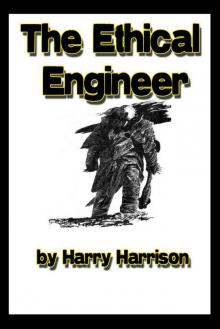 The Ethical Engineer
The Ethical Engineer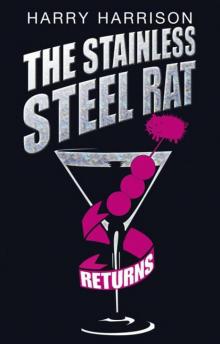 The Stainless Steel Rat Returns
The Stainless Steel Rat Returns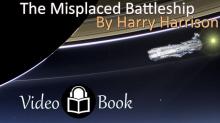 The Misplaced Battleship
The Misplaced Battleship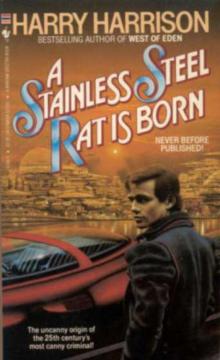 The Stainless Steel Rat is Born
The Stainless Steel Rat is Born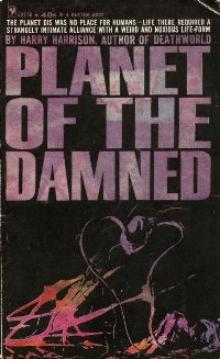 Planet of the Damned bb-1
Planet of the Damned bb-1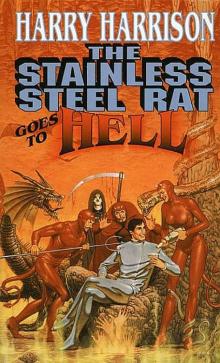 The Stainless Steel Rat Goes to Hell ssr-10
The Stainless Steel Rat Goes to Hell ssr-10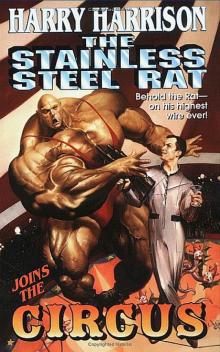 The Stainless Steel Rat Joins the Circus ssr-11
The Stainless Steel Rat Joins the Circus ssr-11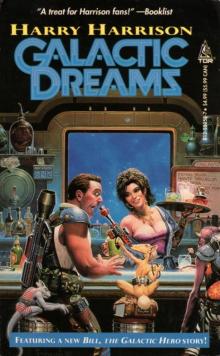 Galactic Dreams
Galactic Dreams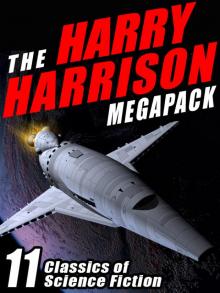 The Harry Harrison Megapack
The Harry Harrison Megapack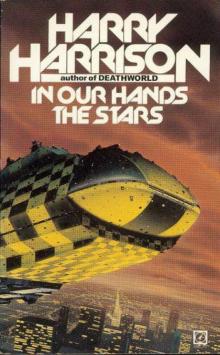 In Our Hands the Stars
In Our Hands the Stars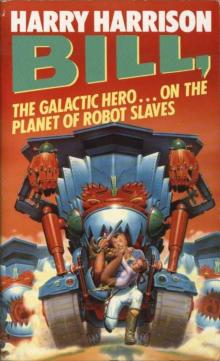 On the Planet of Robot Slaves
On the Planet of Robot Slaves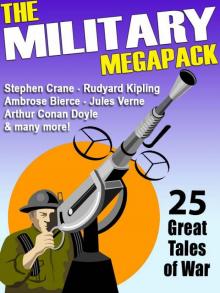 The Military Megapack
The Military Megapack Make Room! Make Room!
Make Room! Make Room! Wheelworld
Wheelworld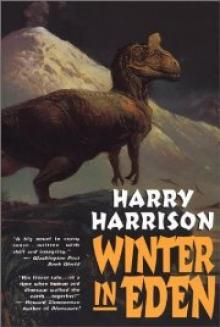 Winter in Eden e-2
Winter in Eden e-2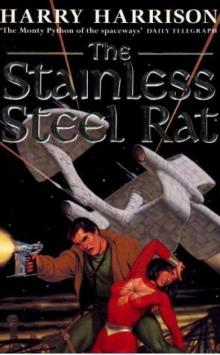 The Stainless Steel Rat
The Stainless Steel Rat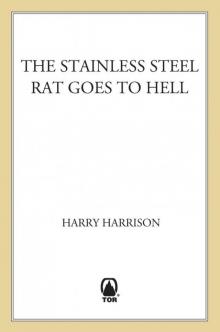 The Stainless Steel Rat Goes to Hell
The Stainless Steel Rat Goes to Hell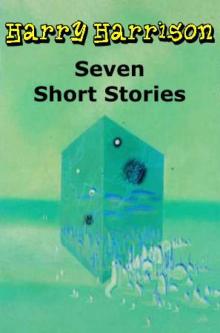 Harry Harrison Short Stoies
Harry Harrison Short Stoies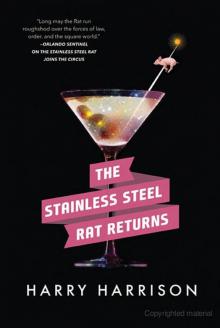 Stainless Steel Rat 11: The Stainless Steel Rat Returns
Stainless Steel Rat 11: The Stainless Steel Rat Returns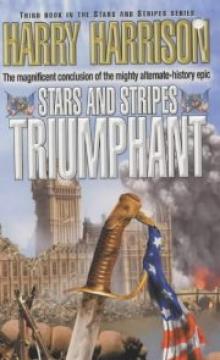 Stars and Stripes Triumphant sas-3
Stars and Stripes Triumphant sas-3 West of Eden
West of Eden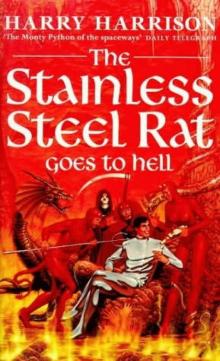 The Stainless Steel Rat Go's To Hell
The Stainless Steel Rat Go's To Hell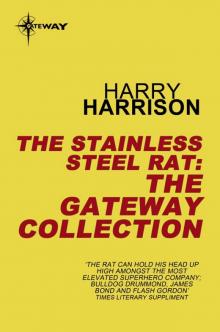 The Stainless Steel Rat eBook Collection
The Stainless Steel Rat eBook Collection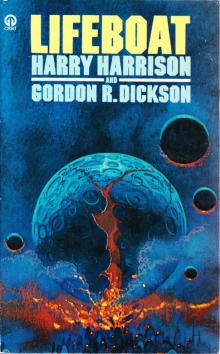 Lifeboat
Lifeboat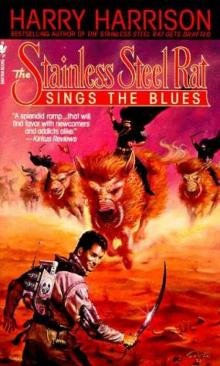 The Stainless Steel Rat Sings the Blues
The Stainless Steel Rat Sings the Blues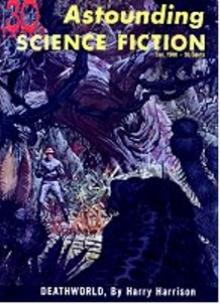 Deathworld tds-1
Deathworld tds-1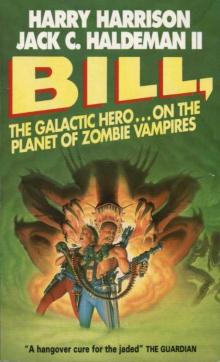 On the Planet of Zombie Vampires
On the Planet of Zombie Vampires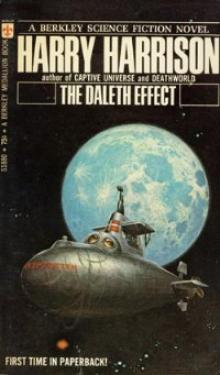 The Daleth Effect
The Daleth Effect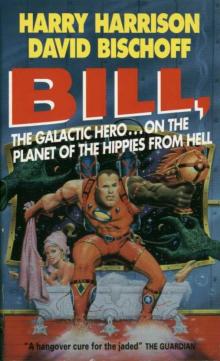 On The Planet Of The Hippies From Hell
On The Planet Of The Hippies From Hell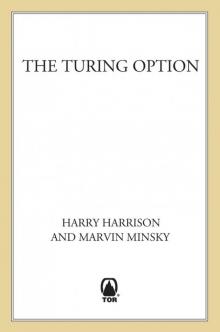 The Turing Option
The Turing Option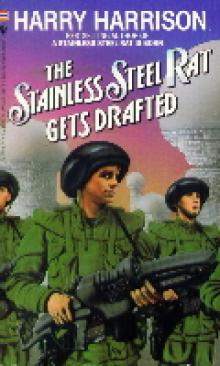 The Stainless Steel Rat Gets Drafted
The Stainless Steel Rat Gets Drafted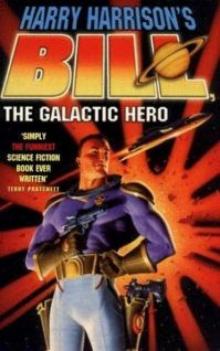 Bill, the Galactic Hero btgh-1
Bill, the Galactic Hero btgh-1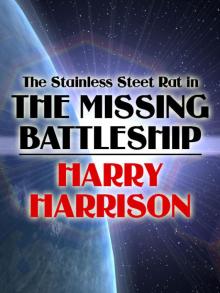 The Stainless Steel Rat in The Missing Battleship
The Stainless Steel Rat in The Missing Battleship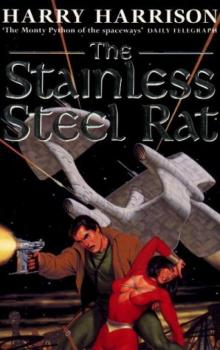 The Stainless Steel Rat ssr-1
The Stainless Steel Rat ssr-1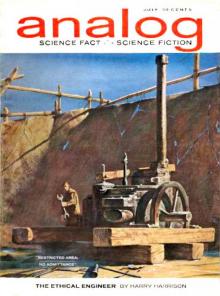 The Ethical Engineer (the deathworld series)
The Ethical Engineer (the deathworld series)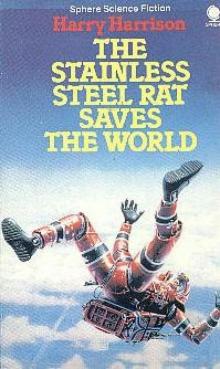 The Stainless Steel Rat Saves the World ssr-3
The Stainless Steel Rat Saves the World ssr-3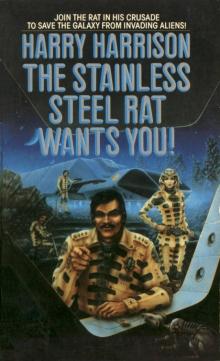 The Stainless Steel Rat Wants You
The Stainless Steel Rat Wants You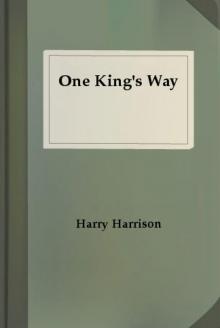 One King's Way thatc-2
One King's Way thatc-2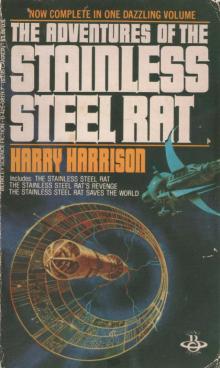 The Stainless Steel Rat Saves The World
The Stainless Steel Rat Saves The World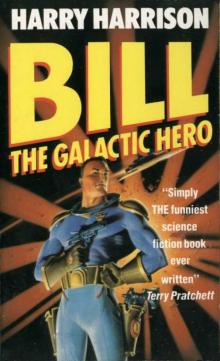 Bill, the Galactic Hero
Bill, the Galactic Hero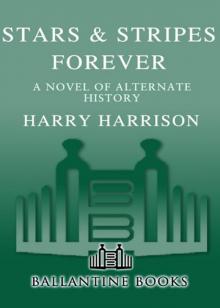 Stars & Stripes Forever
Stars & Stripes Forever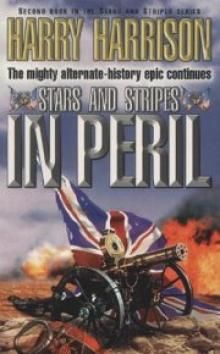 Stars and Stripes In Peril sas-2
Stars and Stripes In Peril sas-2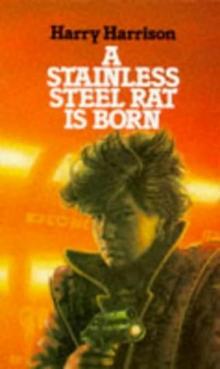 A Stainless Steel Rat Is Born ssr-6
A Stainless Steel Rat Is Born ssr-6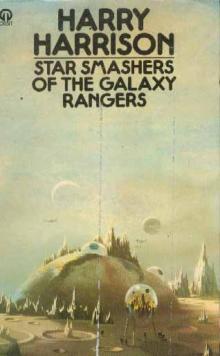 Star Smashers of the Galaxy Rangers
Star Smashers of the Galaxy Rangers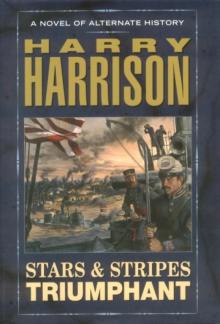 Stars & Stripes Triumphant
Stars & Stripes Triumphant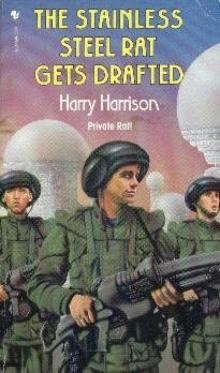 The Stainless Steel Rat Gets Drafted ssr-7
The Stainless Steel Rat Gets Drafted ssr-7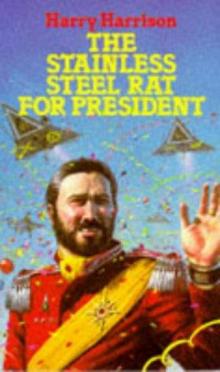 The Stainless Steel Rat for President ssr-5
The Stainless Steel Rat for President ssr-5 The Hammer & the Cross
The Hammer & the Cross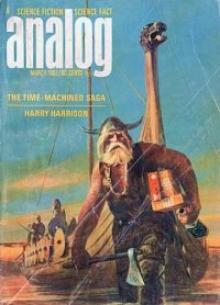 The Technicolor Time Machine
The Technicolor Time Machine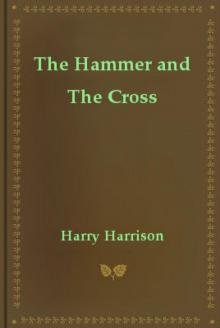 The Hammer and The Cross thatc-1
The Hammer and The Cross thatc-1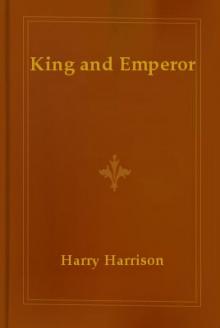 King and Emperor thatc-3
King and Emperor thatc-3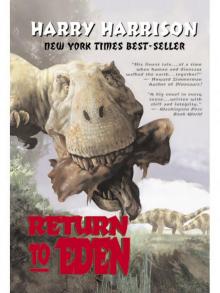 Return to Eden
Return to Eden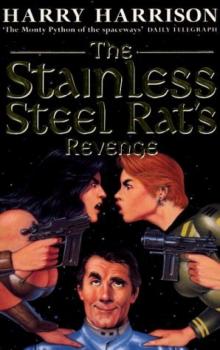 The Stainless Steel Rat’s Revenge ssr-2
The Stainless Steel Rat’s Revenge ssr-2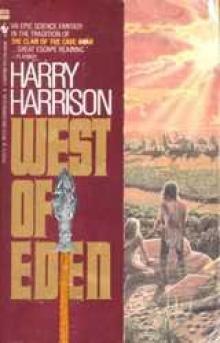 West of Eden e-1
West of Eden e-1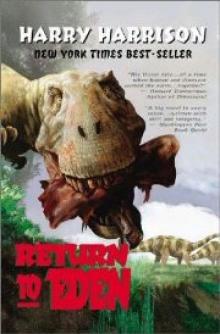 Return to Eden e-3
Return to Eden e-3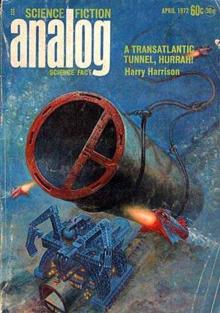 A Transatlantic Tunnel, Hurrah!
A Transatlantic Tunnel, Hurrah!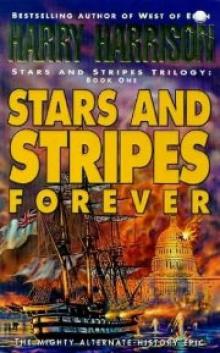 Stars and Stripes Forever sas-1
Stars and Stripes Forever sas-1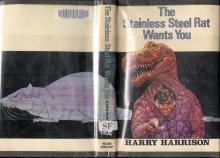 The Stainless Steel Rat Wants You ssr-4
The Stainless Steel Rat Wants You ssr-4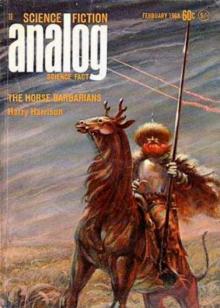 The Horse Barbarians tds-3
The Horse Barbarians tds-3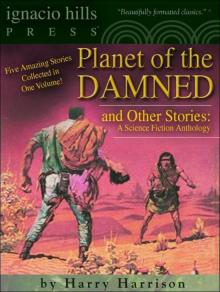 Planet of the Damned and Other Stories: A Science Fiction Anthology (Five Books in One Volume!)
Planet of the Damned and Other Stories: A Science Fiction Anthology (Five Books in One Volume!)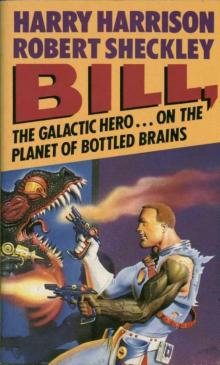 On the Planet of Bottled Brains
On the Planet of Bottled Brains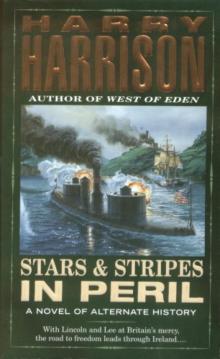 Stars And Stripes In Peril
Stars And Stripes In Peril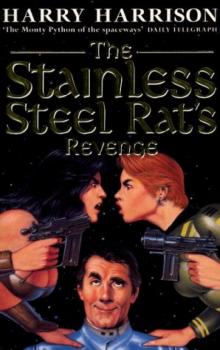 The Stainless Steel Rat's Revenge
The Stainless Steel Rat's Revenge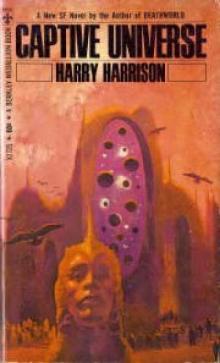 Captive Universe
Captive Universe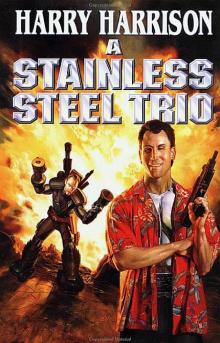 The Stainless Steell Rat Sings the Blues ssr-8
The Stainless Steell Rat Sings the Blues ssr-8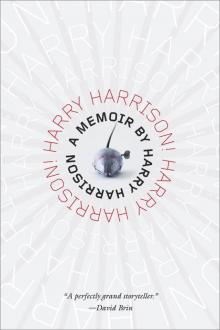 Harry Harrison! Harry Harrison!
Harry Harrison! Harry Harrison!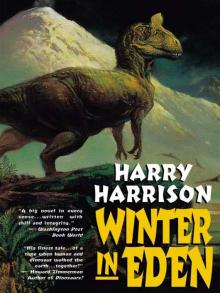 Winter in Eden
Winter in Eden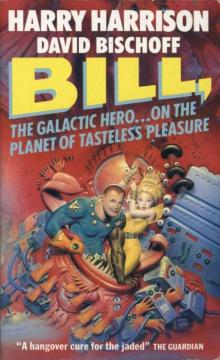 On the Planet of Tasteless Pleasures
On the Planet of Tasteless Pleasures